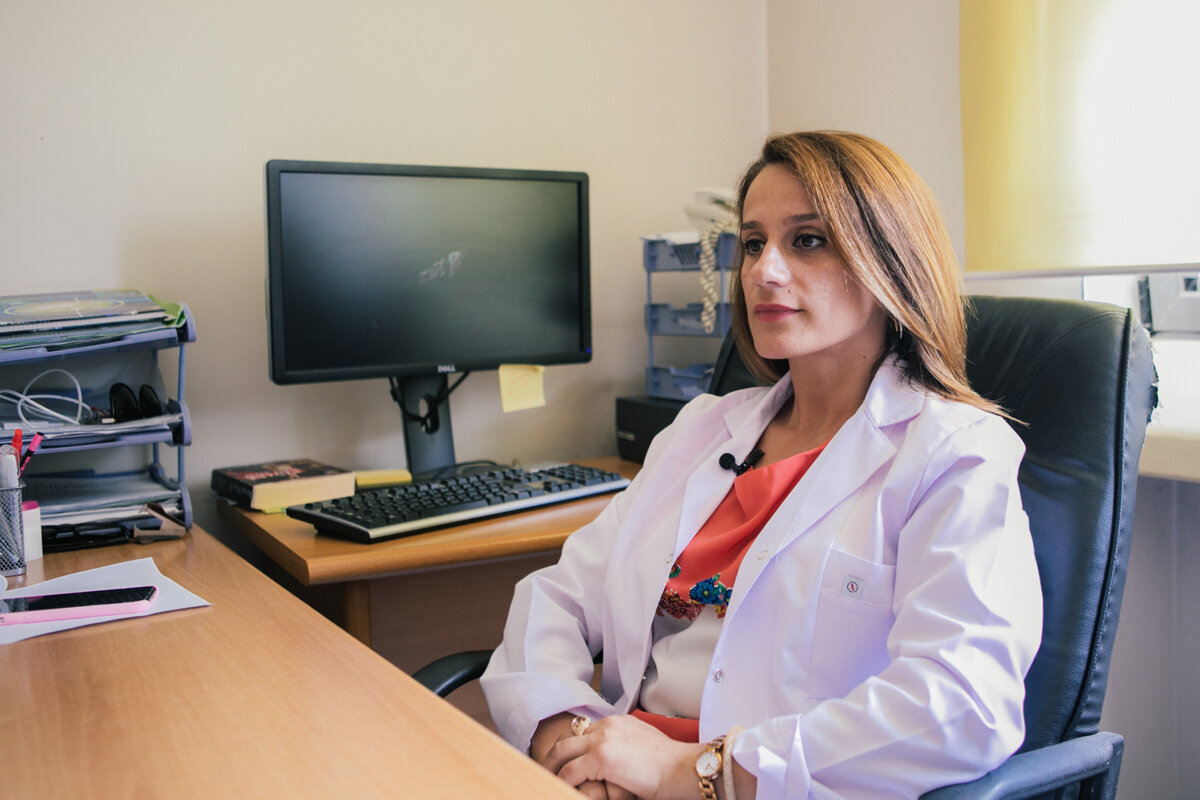
After ISIS: how Kosovo is rehabilitating
women and children repatriated from Syria
Testo di Sara Manisera
Fotografie di Arianna Pagani
25 Lug 2019
Articolo pubblicato su The National, Altreconomia, Newint
Pristina, Kosovo - Visar never expected to see his grandchildren again after his daughter took them with her when she followed her husband to Syria to join ISIS in 2014.
Now, five years later, Visar – not his real name – stands watching his five grandchildren playing in the inner courtyard of his simple home surrounded by rolling hills and cornfields in a remote village 20 kilometres north of the Kosovan capital Pristina.
“The youngest was six-months-old when they went to Syria and the last [grandchild] was not born yet”, he says, lighting one cigarette after another.
If he had known of his daughter’s plan to follow her husband, “I would have done everything to stop them,” he says. “My daughter was threatened by her husband and she was forced to follow him. They made a mistake.
“Was it better to leave them in Syria or try to correct their path? If my daughter was wrong, she will pay for her mistakes, but my grandchildren are innocent creatures” he says.
Visar’s daughter, Edina (also not her name), was married to Arbenin Demolli. He was one of the 316 Kosovars who joined ISIS but was killed in a US airstrike in Aleppo in a few months after their arrival.
After he was killed, his wife and children remained in Syria, moving across ISIS territories first to Hasaka in the northeast and then to Raqqa.
According to Visar, she was forced to marry a second husband, a Kosovar man who is the father of her youngest child. The couple lived in Raqqa until it was liberated in 2017, when they were arrested by US-backed Kurdish forces.
The husband went to jail while Edina and her five children were sent to Ain Issa camp and then moved to Al Hol camp alongside thousands of other former ISIS families.
After he was killed, his wife and children remained in Syria until the Kosovo government repatriated 110 people – mostly wives and children of ISIS fighters –in April this year. Edina and her children were among the group.
“I’m very happy to be at home”, Edina says in Arabic standing by the front door of her father’s house. “I’m lucky”. Edina can’t say much else as she isn’t supposed to talk to journalists. She is under house arrest and will face a criminal trial, but her shy smile reveals her relief at being home.
Many other families of ISIS fighters have not been so lucky to get home. Most are still in camps like Al Hol in north-eastern Syria.
They now live in overcrowded and squalid conditions. “In Al Hol camp alone there are 75,000 people and approximately 12,000 are foreign women and children in a state of semi-detention, exposed to violence. It’s a ticking-time-bomb”, says Domenico Chirico, Syria Programme Director for the Italian NGO Un Ponte Per.
UN human rights chief Michelle Bachelet has urged the international community to repatriate families of ISIS fighters.
Most European governments – including France, Britain, Germany, and Belgium – have repatriated only small numbers of women and children, leaving most stuck in an unstable situation.
Kosovo, however – whose claim of independence from Serbia is recognised by around half the members of the UN and is considered the youngest state in Europe – has launched a unique rehabilitation project for repatriated ISIS families involving psychiatrists, family psychotherapists, imams and female preachers called “Mualime”.
“I’m a kind of bridge between [the women] and society. I visit them and I help them to understand what is the real value of Islam and to live a normal life again”, explains Sanie Gashi Mehmeti, a Muslim preacher from Lipjan, 20 kilometres south of Pristina. She has more than ten years of experience in women’s prisons. “At the same time, I work with the society to help them accepting those women and children”, she says.
Although Kosovo is 90 per cent Muslim, most of the population is deeply secular.
Kosovar society, therefore, stigmatizes the families of those who went to Syria. For this reason, part of the rehabilitation project includes regular meetings with neighbours and villagers in their communities.
“My colleagues and I work with the local population so that the community can accept and reintegrate these women and their children,” says Ms Mehmeti. “It is not an easy process. If they have committed a crime they must be punished. If they have not, they must be helped and reintegrated.
“But if we leave them in those places or we abandon them, they can become even more dangerous. In life, we may commit a mistake but we must teach them the right direction and prevent children from growing up with wrong ideas about Islam", she says.
“This is a long-term process that changes according to the specific circumstances of individual cases”, says Valbona Tafilaj, the coordinating doctor for mental health under the government's rehabilitation and reintegration programme for women and children in their homes.
“With some [women] it will take years, but since we started the initial psychotherapy sessions [we found] the most visible symptoms for everyone, women and children, are post-traumatic stress disorder (PTSD), backtracking and depression”, she adds.
The psychiatric programme includes home visits, individual and family sessions, outdoor activities and a process of reintegration into society through school and training courses.
“With this programme, we first deal with the trauma then we try to work on ideology,” says Ms Tafilaj.
“Many of [the families] did not choose to go to Syria but were forced by their husbands. Others have become radicalized. All, however, have lived four or five years under ISIS and under that ideology. Including children", the doctor says.
The repatriation and rehabilitation program, developed over more than two years, has no guaranteed result. But those involved say it’s their best chance for the women and their societies.
“It is the best solution for this situation and is managed by the state”, explains Mensur Hoti, director of the Public Safety Department of Kosovo.
“The main reason we are doing this project is the children. They are not guilty for being born there or because their parents brought them to Syria. If we leave them there, in ten years we will have another ISIS”.
Rexhep Lshta is the imam of Isa Beg mosque in the city of Mitrovica. He is also involved in the rehabilitation programme and he visits men detained in prisons or suspected of terrorism.
The United Nations has urged the international community to repatriate nationals who joined ISIS in Syria.
A woman walks through a square in Pristina, Kosovo.
Sanie Gashi Mehmeti is a female Imam, also called “Mualime”.
Sanie Gashi Mehmeti is also involved in numerous schooling and violence prevention projects, with the local community and with the women of Lipjan.
Many returned woman are under house arrest as they wait to be tried after being repatriated from north-eastern Syria.
Valbona Tafilaj is the coordinating doctor for mental health under the government's rehabilitation and reintegration programme for women and children in their homes.
The road connecting Lipjan to Pristina runs through lush hills. A rural suburb starts just a few kilometers from the Kosovar cities.
The home of Visar Qukovci, an Isis fighter who joined Isis in 2014 and was repatriated last April by Kosovo government together with his wife and children. He is now detained in prison.
Mensur Hoti, director of the Public Safety Department of Kosovo.
Ferizaj, Kosovo. A graffiti portraying a woman on the wall next to the railway in Ferizaj, Kosovo
Sanie Gashi Mehmeti is a female Imam, also called “Mualime”, runs the rehabilitation program with women and children repatriated from Syria to Kosovo.
Rexhep Lshta is the imam of Isa Beg mosque in the city of Mitrovica. He is also involved in the rehabilitation programme and he visits men detained in prisons or suspected of terrorism.
The Institute for International Political Studies (ISPI) believes that around 40,000 people – including women and children – from more than 80 countries travelled to join ISIS in Syria and Iraq.
Didascalia di copertina: Kosovo, however has launched a unique rehabilitation project for repatriated ISIS families involving psychiatrists, family psychotherapists, imams and female preachers called “Mualime”.















